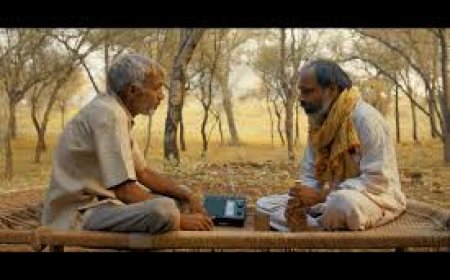From Childhood Curiosity to Cinematic Reality: Reema Borah's Journey to Filmmaking
Hailing from the tranquil town of Biswanath Charali in Assam, Reema Borah is a filmmaker who has been praised for her socially conscious filmmaking. She graduated from the Film and Television Institute of India (FTII), Pune in 2007 and has since directed several short films, documentaries and feature films which have won various awards. Borah's talent was evident from the very start, as her diploma film 'Echoes of Silence' not only garnered praises but also earned Zubeen Garg his first National Film Award for Best Music Director for a Non-Feature Film in 2009. She has also assisted many renowned filmmakers in Mumbai and taught filmmaking in various colleges and universities across India. Her contribution to Assamese cinema includes films like 'Bokul' and 'Noi'. Borah's recent film, 'Anunaad-The Resonance', stands as a testament to her commitment to cinema for social cause as it won the National Film Award for Best Film on Social Issues. Read on for an exclusive and comprehensive look into the life and achievements of filmmaker Reema Borah.
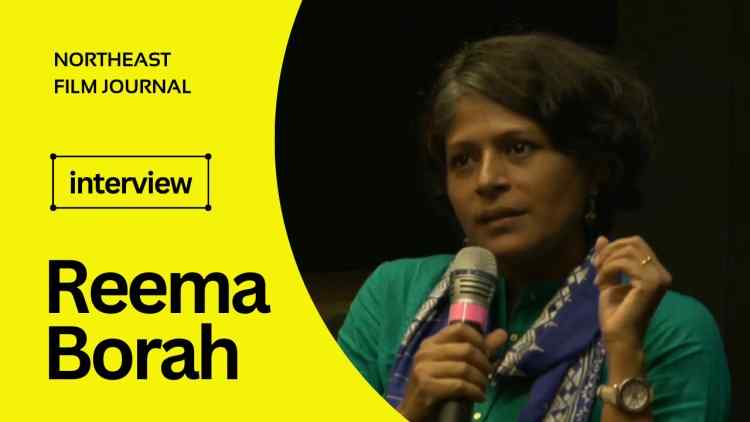
Question: Can you describe your journey into the world of filmmaking? What sparked your interest in this art form, and how did that passion evolve over time?
Answer: I didn’t have any specific intention or formal plan to venture into the realm of filmmaking as such. Nevertheless, as this question is frequently asked to me, I often find myself reflecting on the origins of this aspiration, which actually can be traced back to my ardent reading habits during my formative years. In my school days, I used to immerse myself in a wide array of books and magazines. Living in close proximity to a local library, I became a member in my seventh year of schooling and made it a routine to visit the library at least thrice a week. I would select books that would hold my interest and immerse myself in their narratives. Like many, I too would visualize everything I read. In this manner, the seeds of visualizing, imagery, and a latent inclination towards cinema were sown in my mind. Over time, this budding interest blossomed into a genuine fondness. And very often in my life, I have found myself favoring this world of my imagination over reality.
And later as I progressed through my eighth and ninth grades, my exposure to cinema happened through the various films telecast on Doordarshan back then. This experience, I believe, was shared by many of my contemporaries. And during these televised screenings, when the cast and crew of the film were introduced, I observed a recurring affiliation with the Film and Television Institute of India (FTII). The name FTII then became etched in my consciousness. Subsequently, as I came across interviews of filmmakers like Jahnu Barua and Adoor Gopalakrishnan in various newspapers, my attraction and affinity for FTII gradually took root. It is worth noting, however, that at this stage, I had not yet developed an exclusive passion for filmmaking. Rather, my trajectory was shaped by my curiosity, which ultimately led me to FTII, where my burgeoning interest in cinema took definitive form.
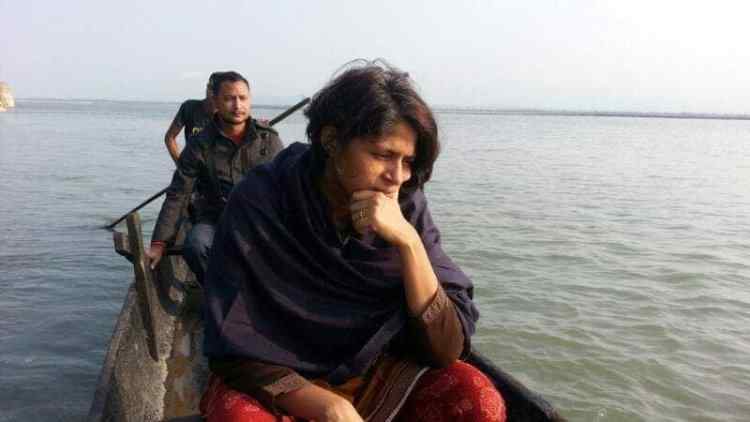
Picture: Reema Borah
Question: So, looking back what were some of the biggest challenges you faced at FTII? And how did you overcome these challenges?
Answer: It was a golden period for me. The entire world was new for me. When I first arrived at FTII, I was unaware if any women from Assam had gone there to study. I later learned that there was a senior named Pink Brahma Choudhury. However, the name of the only Assamese person I had previously known was Jahnu Baruah, who had enrolled in this place to study direction. The exposure I received there was completely new. Everything was new, and I didn't want to miss out on anything. I was a very curious learner, and each day brought something new and exciting. It was a truly euphoric experience for me.
However, there were also challenges. All of the other students came from prestigious schools that gave them an advantage in terms of the subject matter and the ease of the language. And me being from a small town high school in Biswanath Chariali, it was initially difficult for me to adjust to this new level of learning. Although I had completed my undergraduate and postgraduate studies in English later, the small-town lifestyle and attitude or the lack of it persisted. This was not exactly a challenge, but rather an encouragement for me to learn and grow. After all, the other students had a wealth of knowledge and experience; some came from Mass Communication background, some from Film Studies, and some who had already assisted on various productions in Bombay. The diversity of the students motivated me to push myself further.
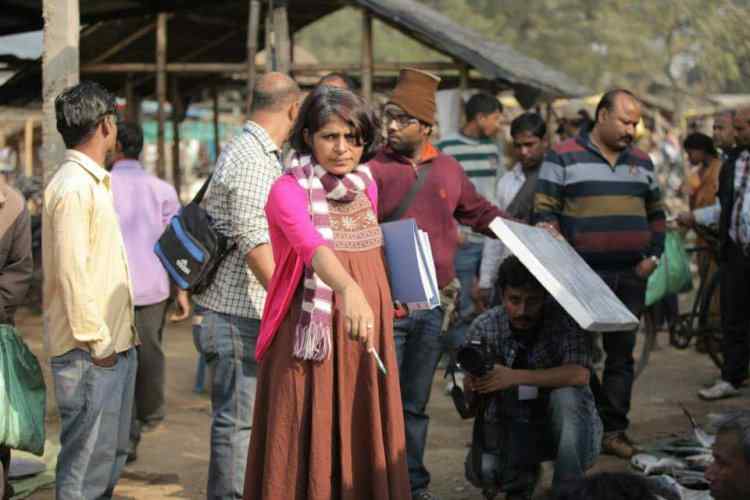
Picture: Behind the shoot - Bokul
Question: Tell us something about one of your first films, that is ‘Their Story (Xihotor Kotha)’, which you shot while at FTII.
Answer: During my second year in the institute, we were tasked with the making of a short film that is to be shot inside a studio. I decided to make a film based on a story set in Assam, and I wrote a script accordingly. The story included some scenes of rain and a man fishing in a pond too. Then there was a team with us for production, and it included friends from the cinematography, sound and editing departments. Everyone was shocked when they read my script. They asked me why I had written a story with such elements, given that it was to be shot in a studio.
The story was set during a politically turbulent time in Assam, and I wanted to capture the suffocating atmosphere that I had grown up in. This was a challenge, as I needed to recreate Assam inside a studio. Creating the sets was not that difficult, but filming the rain and fishing scenes was challenging, as the studio floor was made of wood. The faculty had already warned me that I would be responsible for any damage to the studio, so I and my team carefully created the sets and filmed the scenes, and then later also cleaned the studio ourselves. So… yes, that was a kind of madness on my part to make the film. It was certainly challenging, but it was also a rewarding experience.
Question: Can you walk us through your journey after graduating from FTII? What were some of the significant projects or opportunities you had during this period and the challenges you faced along the way?
Answer: To be very frank, I did not experience any significant struggle in the traditional sense of the term. I had the emotional and financial support of my family, and my only challenge was to make the kind of movies I wanted to make. This creative struggle was constant.
While at FTII, filmmaker Rakeysh Omprakash Mehra had screened his film, Rang De Basanti, for us and interacted with us. I was inspired by his words, and I felt a sense of urgency to pursue my filmmaking career in Mumbai. I knew that I would need money to make my own films, so I sent an e-mail to Mehra. He rarely checks his emails, but he responded to mine immediately and invited me to meet him. I showed him my diploma film, and he offered me to join him that day itself.
After graduating from FTII, I joined his team and worked on his film, Delhi-6. My responsibilities included location scouting, casting, and dialogue references for Prasoon Joshi, the film's co-writer. I collected local dialogues from various places in Delhi, such as the Chandni Chowk area. This was a very stimulating and rewarding experience for me. I loved being out in the field, meeting new people every day, and scouting locations. I loved doing it, but the work became repetitive after a while and then I got exhausted. The film was also delayed, and I decided to leave after that. The nature of the work was unpredictable work, but I really enjoyed it.
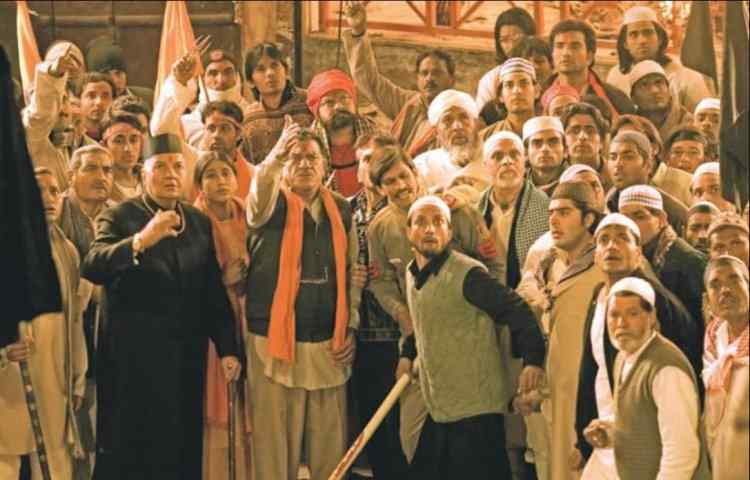
Picture: A still from the film Delhi-6
Then next, I worked with Rupali Guha, the daughter of Basu Chatterjee, as an assistant on a film that she had made. I worked on the aspects of casting there. At the same time, Amit Kumar, a senior of us from FTII made Monsoon Shootout, and I had also lent a hand in casting for that film. My responsibilities took me on extensive journeys across various regions of India. Interestingly, I had the opportunity to cast Vijay Varma in Monsoon Shootout, in one of his early films. I continued in this role until I realized that working as an assistant in film productions was no longer my cup of tea. During this time, I also got married, and in between, I worked on a few documentary films, traveling to places like Madhya Pradesh and Rajasthan.
And then, when I conceived after getting married, I slowed down my work. Later on, I began teaching at various film institute and colleges in Mumbai, including Mumbai University. And as time went by, I felt that I had gained enough experience and decided it was time to make my own film. Finally, in 2015, Bokul was brought to life.
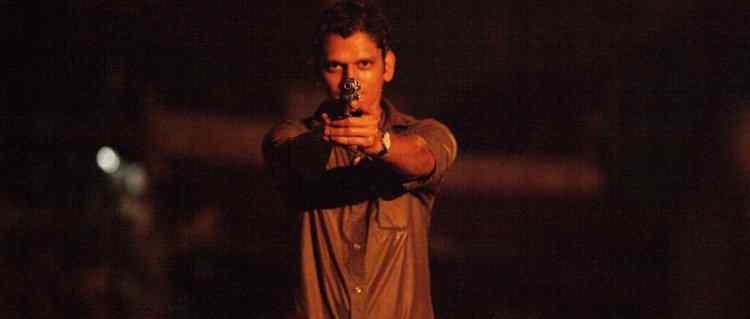
Picture: A still from the film Monsoon Shootout
Question: What were some of your early experiences or lessons from filmmaking that shaped your perspective and continue to inspire and guide you today?
Answer: I've come to understand that instead of just thinking about doing something, we should take action and do it. Yes, there will be consequences, but we shouldn't let that hold us back. This realization first struck me during a master class at FTII with Mani Kaul sir. He was a guru for the third-year students. We learned a lot from him and had many personal discussions about his films.
So, what happened was that, Mani Kaul had made a significant film in Indian cinema called Uski Roti in 1969. However, he struggled to find opportunities to make more films afterward. People even mocked him, questioning his accomplishments. The writer of the short story that Uski Roti was based on - Mohan Rakesh - was also very disappointed with the way Kaul had adapted the story. And despite the challenges, Mani Kaul was determined to make another film, but he faced many rejections because no one wanted to produce the kind of films he envisioned. Eventually, cinematographer Navroze Contractor joined him, and they managed to secure some film reels and an old camera to shoot a new film. They went to an interior village in Rajasthan, where Mani Kaul's pregnant wife also accompanied him.
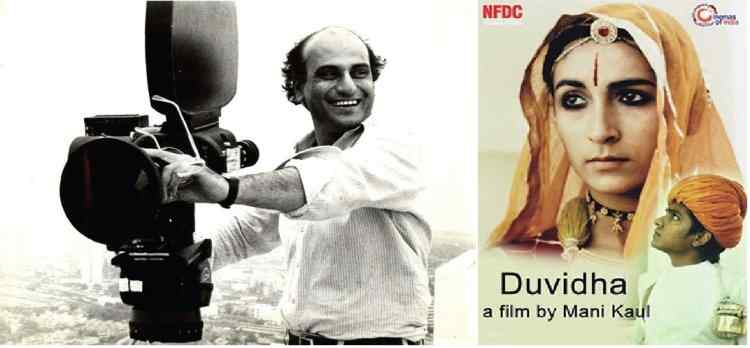
Picture: Finding Inspiration in Mani Kaul
During the shoot, they faced several difficulties with lighting due to power supply issues in the village, and Mani Kaul's wife also experienced labor pain. He shared this entire journey with us and emphasized that these struggles and pains go unnoticed by others. What matters most is the film that people will eventually see. All the hard work and challenges are only a part of your personal learning and growth. It's your personal journey, and because the film is what people will watch, you have to make it, no matter what.
These words stayed with me, and later when I made Bokul, I found inspiration in Mani Kaul's story. It made me realize that the process of making the film is more important than the difficulties encountered along the way. I was determined to make the film, and interestingly, when I made Bokul, I was nine months pregnant!
Question: Tell us something about your film Chaatak. Are there any particular theme, or narrative structure that you find yourself drawn to?
Answer: Chatak is actually a Hindi film with a runtime of some 50-55 minutes. It shares a narrative style similar to Bokul because I enjoy working with multiple storylines. And I'm drawn to the epic form, where many characters live in the same place, same community. The movie also explores themes of insurgency.
In Chatak, there are about five to six characters that live in the same locality and they frequently cross paths with each other, such as at the market place or tea stalls. However, they are not deeply connected to each other on a personal level. These characters are all linked to a tragic incident that unfolds in the film. There's a wannabe director. He has written a script, and after he finishes it, he goes to the marketplace. However, when he arrives, the characters he had encountered earlier are gone, and now it’s only his script with him. Such was the story of the film.
Question: Your films explore social issues and often feature characters from the marginalized sections of the society. Can you elaborate on the driving force behind your choice of such themes and characters? Does your work reflect your personal philosophy of life?
Answer: To an extent, yes. I create films based on what I observe in my surroundings, my family, and my neighborhood. And I haven't really come across extremely wealthy people. I come from a very middle-class family. Let's agree that everyone has their own set of needs, and we witness many such needs around us. And regarding my ideology, it's fair to say that I lean towards the left. Since my childhood, I've been reading books on these topics, and they've greatly influenced me. And somehow, the struggles of marginalized, oppressed, and the unheard voices in our society resonates with me, and therefore I'm always on the lookout for alternative voices that express these concerns.
And regarding the social issues in my films, I wouldn't exactly label it as ‘issue’, though. It's a part of our life, I'd say. Our upbringing has shaped us this way… whether it's in terms of the structure or the socio-political and cultural. So, it's not easy for me to single out something as an ‘issue’. We live with it and it's an integral part of our lives.
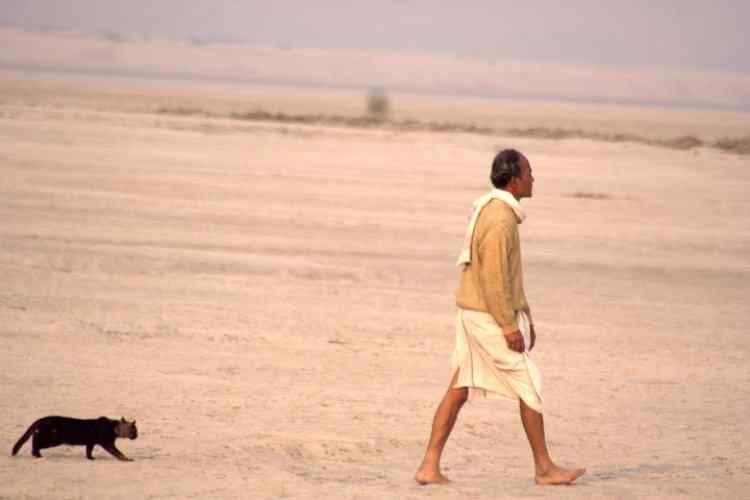
Picture: A still from Bokul
Question: Among all the films you have made, is there one that holds a special place in your heart? If so, what makes it so dear to you?
Answer: Actually, every film I've worked on has been a unique journey. Bokul stands out on a different level. The way it was created, it felt like a dream. The passion within me and the support received from everyone made it a one-of-a-kind experience. I know I won't be able to recreate those exact feelings and circumstances in my life again. However, I believe that I've gained valuable knowledge and experience along the way. So, when it comes to a fulfilling personal experience, Bokul takes the lead. But if you're ask me in terms of experimentation with the film form and craft, that would be Noi. I've learned a lot from the process, and I thoroughly enjoyed the journey.

Picture: Posters of Bokul and Noi
Question: Your recent film Anunaad-The Resonance has garnered critical acclaim and have won the National Film Award for Best Film on Social Issues. What inspired you to make this film?
Answer: Once again, the film Anunaad isn't solely focused on addressing a specific ‘issue’ per se. Actually what happened was, during my time teaching at various institutes and colleges in India, I came across a documentary film on bride trafficking when I was in Rohtak. The topic left a lasting impression on me, and then a senior from FTII also made a documentary on a similar theme. And later many other movies like Matrubhoomi have also explored this issue. So, over the years, this issue continued to stay with me, and I developed an interest in it. My research revealed that such practices were widespread in India, and it can be found in Assam as well. Girls from places near my home, such as Biswanath Chariali and Morigaon, were falling victim to these situations. Then I began to outline the script, incorporating themes related to personal space, public security, and the struggles these individuals face. Gradually, I transformed this outline into a complete script and eventually brought the story to life as a film.
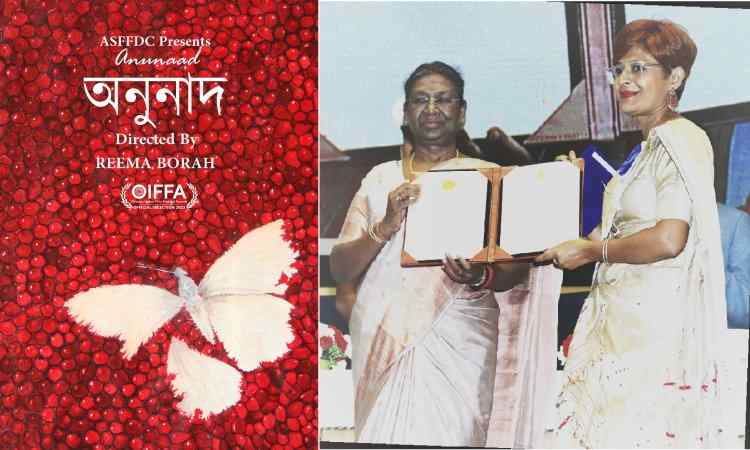
Picture: Reema Borah receiving the National Film Award for Anunaad from the President of India Droupadi Murmu
Question: You've always opted to release your films through digital platforms instead of traditional theatrical releases. Are you against the concept of releasing a film in the cinema halls?
Answer: Actually I haven't thought about it that way. Of course it would be different if there was a substantial audience for these types of films. But what actually happened during Bokul in 2015 was quite interesting. Many colleges and universities in Assam invited us to screen the movie. And this included medical colleges and even IIT. This level of interest for an Assamese film was something I hadn't seen before. Then, I also took the film to many small towns and villages in Assam and I also engaged in discussions with the audience. Again this kind of an engagement between the audiences and the filmmaker was a new experience for me in Assam. It made me realize that instead of releasing a film in theaters, there are alternative ways to reach the audience. So, I decided to experiment with this approach.
Also, I have doubts about whether my movies would attract the general cinema-going audience, given the kind of films I make. That's why I prefer not to invest a significant amount of money on a theatrical release, especially after having financed everything independently...
Question: …And if a distributor comes forward?
Answer: If a distributor is interested or someone is willing to take responsibility for a theatrical release, then definitely I'm open to the idea of it.
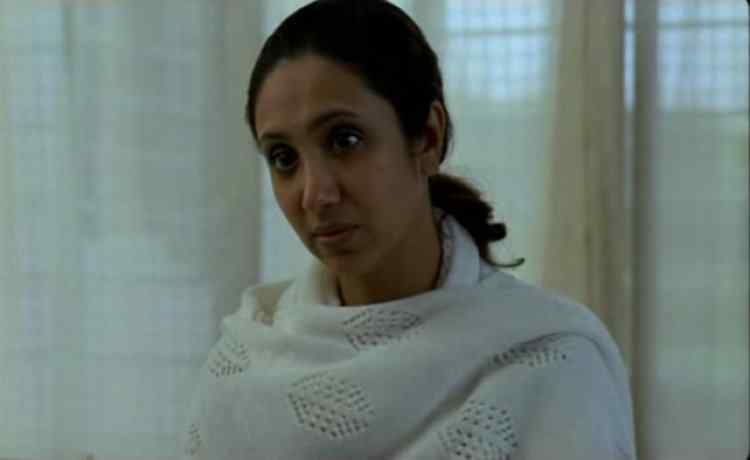
Picture: Sonali Sachdev in a still from Reema Borah's diploma film Echoes of Silence
Question: So, now having made three feature films yourself, how would you assess the current state of independent filmmaking in the region?
Answer: Yes! Our support towards independent filmmaking is very essential. However, filmmakers should also have a responsibility to create quality work. And I know everyone understands that. Recently, I was very impressed by some short films that I had the privilege of watching for some purpose. And the encouraging fact is also the increasing number of female filmmakers. So, I really hope to see more work from these talented individuals.
Actually what happened in our time was, we started working as independent filmmakers, but we eventually lost momentum. So, there needs to be a consistent flow of filmmaking. And I don't think I've seen that flow, or maybe I am just unlucky. But either way, consistency is the key.
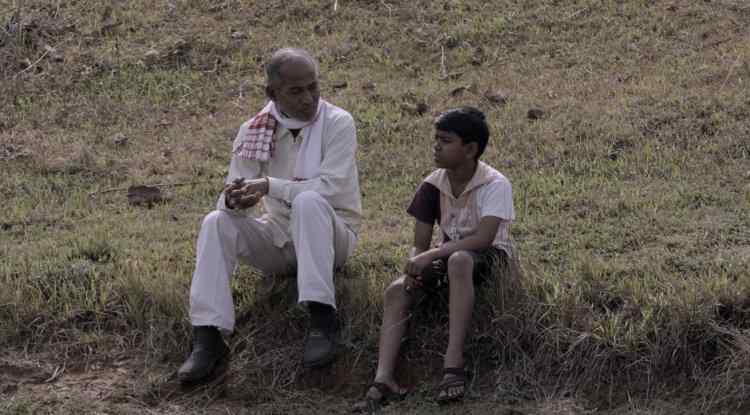
Picture: A still from Noi
Question: And as we conclude this conversation, can you share any insights into your upcoming projects or future aspirations within the filmmaking industry?
Answer: I have a few ideas for some new projects, but I haven't started on with anything yet. This is because filmmaking is expensive, and I need to get the funding together first. Meanwhile, I'm still writing down my ideas, as always. Some of them are adaptations of existing literary works, and some are original ideas. I don't know if I'll ever make all of them, but I hope to make some of them someday. And I'll need a lot of money to make all of my ideas into movies. So maybe by the time I save enough, I might be too old to make them, but let’s see what happens (laughs).
##############
What's Your Reaction?























































